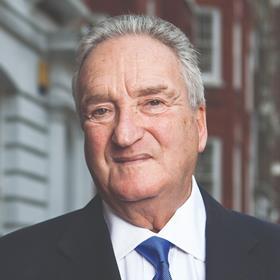After a tumultuous 2020, property’s leading figures share their hopes and expectations for 2021 as the year gets off to a rocky start with yet another lockdown.

Jonathan Goldstein
Chief executive, Cain International
My hope is for the vaccine and improved medical understanding and treatment of the virus to bring an end to the personal cost that so many have suffered. Last year put a spotlight on issues that have long been overlooked and this year we need to tackle those issues head on.
I hope we can embrace the flexibility of working from home while understanding that while we may be digital by default, we are not by design. We face serious risks to our prosperity if we allow WFH to limit innovation, motivation and diversity in all its forms. It is time for real estate to properly embrace diversity and reflect the world we live in.
In my 2019 prediction, I stated that “we should expect the unexpected” and I’ll confidently echo that this year. In times of disruption there are both challenges and opportunities, perhaps none more so than in hospitality. The opportunities to build a business in that sector will be once-in-a-generation. It will be a venture for the brave, but the rewards will be worth the risk.

Harvey Soning
Chairman, James Andrew International
The vaccine rollout and Brexit will drive the direction of travel. I fear the economic recovery will be gradual, but recovery we will see and it will be strong in Q3 and Q4, for parts of the market, anyway.
For the retail sector, there are further problems to come. In central London, the delays to Crossrail and the removal of VAT refunds for visitors, coupled with the absence of tourists, will make trading difficult for many and could see much of the luxury goods sector move to the Continent, particularly, Paris and Milan.
UK town-centre recovery is going to take time. Landlords, mortgagees and local authorities will have to work together to make town centres as attractive as possible, in terms of rentals, lease terms and the environment. Recent changes to the planning system may or may not assist.
In the office sector, we need people back behind their desks. Commuters and office workers bring life to town centres and this will be just part of the retail revival. I was pleased to see the statement made by the chief executive of Goldman Sachs that staff should return to work.
Sell your shares in Zoom – face-to-face meetings will be back when the lockdown ends. How can the young learn their trade without human interaction? For those determined to work from home – beware, your job is at risk. These jobs can be transferred to other parts of the world at a fraction of the cost.
Warehousing and logistics is likely to remain flavour of the month. Online sales are set to continue growing. The growth in demand and rents should continue. For the hotel and leisure sector, decimated by the pandemic, things will begin to improve, but it will probably be 2023 before we return to the pre-Covid worldwide visitor numbers.
For investors, Brexit should see a serious influx of funds from Asia, the Middle East, the US and Europe. With the weight of money within the global funds seeking top-class investments, I expect to see prime yields below 3%, whether or not the pound hits parity with the Euro. Investors in retail will be opportunistic buyers looking to reposition the investment. My glass remains half full. After 2020 the only way is up.

Matt Crompton
Managing director, Muse Developments
It will be summer by the time the impacts of the pandemic will have largely dissipated save, of course, for those whose health or livelihoods have been directly affected. I fear that the impact of Brexit will be felt for much longer.
We will continue to develop safer, more sustainable buildings guided by legislation and a desire to do the right thing for our occupiers and the environment. Access to open space and amenity will be valued much higher.
Occupiers and investors will be more discerning and selective, favouring quality over price. The public sector will have tough decisions about where to invest its increasingly scarce resource. Town centres will thrive again once the right balance of retail, commercial and urban residential has been created.
Many of us have been on a steep learning curve around remote working, digital communication, wellbeing and hygiene. We must take these positive experiences into 2021. The deep recession we face will favour long-term regeneration partnerships between tried and trusted partners. I hope we will not forget how important health and free movement is to a stable economy and work/life balance.

Grant Lipton
Director and co-founder, Great Marlborough Estates
All eyes will be on two things: the housing market and London. The unusual nature of this pandemic combined with government support, such as the stamp duty holiday, resulted in solid house price growth once the initial lockdown measures were lifted. With the government looking to end the stamp duty holiday next year and reforms to Help to Buy coming into effect, many will wonder if house prices can continue their upwards momentum.
At Great Marlborough Estates, we believe the answer is ‘yes’ – providing the government does all it can to ensure a smooth recovery. While the Treasury will have a watchful eye on the mounting national debt pile, the damage done if support is withdrawn too early will be even more costly. There is a clear case for extending the stamp duty holiday and looking at other measures too. House prices play a key role in driving consumer confidence, which in turn drives economic growth.
The first lockdown led to dire warnings of a mass exodus from the capital to the countryside that failed to materialise. I suspect those calling time on central London offices thanks to the power of Zoom will be proved similarly wrong.
Continue to part four here
Forecast for 2021: looking ahead with hope
- 1
- 2
- 3
 Currently reading
Currently readingForecast for 2021: looking ahead with hope (part three)
- 4
- 5
- 6
- 7
- 8
- 9
- 10
- 11
- 12
- 13
- 14
- 15
- 16
- 17
- 18
- 19
- 20
- 21
- 22
- 23
- 24
- 25
- 26
- 27
- 28
- 29
- 30
- 31
- 32
- 33
- 34
- 35
- 36
- 37
- 38
- 39
- 40
- 41
- 42







































































No comments yet